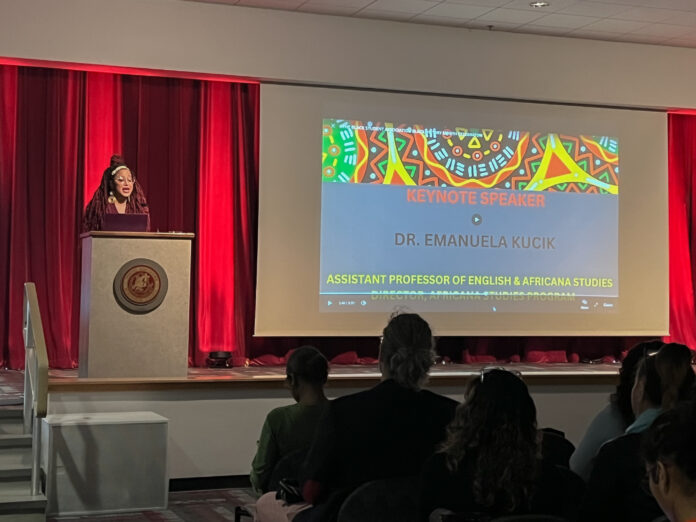
The Office of Multicultural Life (OML), Black Students Association (BSA) and the Men of Color Network hosted their annual celebration of Black History Month (BHM) on Sunday Feb. 26 in the Event Space with the theme of Black activism. The event’s objective was to showcase how music, dance, art and spoken word can honor Black community members who have made an impact in promoting an inclusive and equitable campus environment.
Robin Riley-Casey, director of the Office of Multicultural Life and associate dean of students, said, “The Celebration is an annual event that provides affirmations and words of support to Black community members—that their work and presence is valuable.” The event kicked off with a welcome address by president of the BSA Bianca Bolt ‘23 followed by a performance from Rejoice! Gospel Choir led by Eric Thompson ‘10. Then, Richeta Cubano ‘24 started off her Poet Unity (poetry and community) segment by asking the audience, “What do you love about being Black?” While some audience members talked about their food, their hair and their culture, Cubano emphasized that she cherishes “walking into a room and feeling pure and genuine Black love. It’s seeing unity, seeing restoration and seeing revolutionary Black love.” Cubano encouraged Black people in the audience with the last few verses of her poem: “Your melanin radiates rooms/You take up space with your power and grace/And you are destined to be all that you set out to be. You will not be trapped in any box of restrictions/but I set you free to be the king and queen you were meant to be/You are loved, you are beautiful, you are worthy. Hey Black people, I love you, did you know that?”
“Your melanin radiates rooms/You take up space with your power and grace/And you are destined to be all that you set out to be.”
Richeta Cubano ’24
The keynote speaker was Emanuela Kucik, Ph.D., assistant professor of English & Africana studies, inaugural faculty fellow for Diversity, Equity, Inclusion & Belonging (DEIB) initiatives, Africana studies director and staff advisor for BSA. Her talk was titled “Dreams of the Unrealistic,” and Kucik explained that “dreams are not a lofty ideal we cannot obtain, but rather as a seed of true activism precisely because dreams untether us from the reality that we are supposed to claim.” Addressing how students can become involved with activism, Kucik highlighted that “the beginning, and honestly, the entirety of activism, is rooted in your individual dreams. In your belief of all you can do in a world that tells you that reality limits your possibilities. Your activism, which will look different from the person sitting next to you, is rooted [in] who you are and what you envision for yourself and for the world.”
“The very notion of Black freedom was once a dream pinnacled as unrealistic. A celebration like this one, an integrated room celebrating Blackness, was deemed unrealistic even in the most recent decades.”
Emanuela Kucik Ph.D
One key part of her speech was centered on the need to disregard the myth that one person cannot make change. Kucik stressed that “[Frederick] Douglas’s unrealistic dream of abolition inspired Dr. King’s unrealistic vision of desegregation that inspired Toni Morrison’s unrealistic vision of a world that centered Black women’s experiences. I’m not speaking of their dreams to overwhelm you with thinking that we can never do what they did, I’m speaking of their dreams to remind us all that they framed their hopes and their goals as dreams precisely because they were told their visions were impossible in this world. But they dared to imagine otherwise. I am speaking of their dreams to remind you that the very notion of Black freedom was once a dream pinnacled as unrealistic. A celebration like this one, an integrated room celebrating Blackness, was deemed unrealistic even in the most recent decades. More than anything, I am speaking of their dreams to remind you of your own.” She concluded her speech saying, “Together we can be the unrealistic dream that wakes the world while it sleeps.”
Zaleeae Sierra, a 19-year-old who is the youth coordinator at Promise Neighborhoods of the Lehigh Valley, a nonprofit organization that helps create safe and inclusive neighborhoods to help children succeed, discussed the importance of youth sharing their voices. She articulated that “I have a dream, but this time it needs action. This dream requires you to be bold and courageous. You need to be a disruptor against any acts of racism in this country. You will need to unlearn and relearn the trauma and the history of this nation that has caused harm to our people. Because my life matters, and my voice matters too. We will need to come together and learn from one another and understand that hate is not okay. We must be willing to put ourselves in uncomfortable situations to then solve the problem. Remember, silence can also be violence… We [youth] are the future. We cannot tolerate systems designed to break our people. It’s now or never to stand up and speak of solutions and of what we need to do to protect our future.”
The event ended with a vocal and dance performance by Jordan West ‘23. According to Riley-Casey, an important takeaway from the event is that “The struggle for equity, inclusion and belonging is ongoing. It is important to honor those that came before us, we will celebrate each other’s accomplishments.” Riley-Casey concluded that “living a life of joy is our birthright. We will dance, we will sing, write poetry, speak truth and live freely.
Bolt voiced her thoughts on Black activism as “working to eliminate racial inequalities. I think at Muhlenberg Black activism looks like not only creating safer spaces for Black students, but making the existing spaces we do have safer for Black students. Additionally it means acknowledging the institutional problems that work against Black students and doing the work to fix them. It is important to understand that while Black people should take the lead in initiatives concerning Black people, support and solidarity is required from non-Black POC and white people. Non-Black POC can give solidarity and promote racial equality by stepping back and educating themselves on situations that they can’t or may not relate to about the black experience. They can also be a support system/ally in spaces that have proven to be unsafe or biased towards Black people.”
“We will need to come together and learn from one another and understand that hate is not okay. We must be willing to put ourselves in uncomfortable situations to then solve the problem. Remember, silence can also be violence… We [youth] are the future. We cannot tolerate systems designed to break our people. It’s now or never to stand up and speak of solutions and of what we need to do to protect our future.”
Zaleeae Sierra
After the event, Nicole Alberto Agramonte ‘26 said that she felt “very much transformed by the mention of dreaming by Dr. Kucik. When you are constantly surrounded by racism and systemic oppression, you tend to forget the value of dreaming. Dreaming drives society forward, and it’s a crucial part for the progression of society. It’s important to recognize the dreams of Black people and the dreams of people of color in general. Being vocal about these dreams helps recognize the humanity of persons of color.”
Shaiyan Feisal '26 is a neuroscience major with a minor in public health. She enjoys writing news and arts & culture pieces to highlight the various voices among the student body and show the variety of commodities Muhlenberg has to offer. When she isn't writing, she enjoys reading murder mystery novels and painting.






















